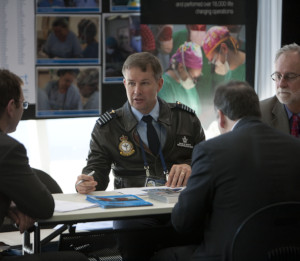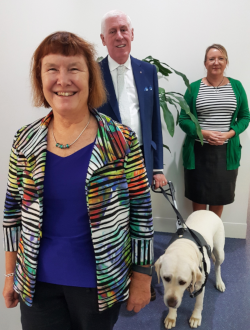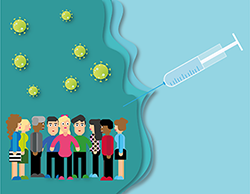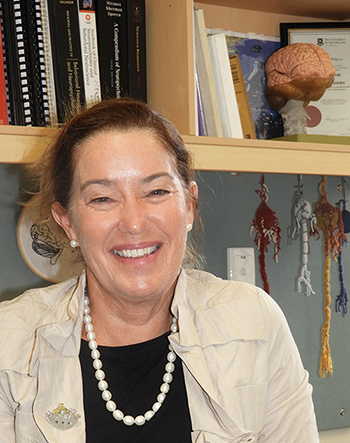
Dr David Scott awarded OAM
Dr David Scott is the recipient of well-deserved community recognition for his service to Australia, particularly in the area of anaesthetic services.
David arrived in Lismore 26 years ago and has served our community with diligence and distinction, both in the public and the private sectors, at a national and international level.
Along the way David has provided clinical leadership, training to young trainees, anaesthesia and pain management and consultancy, particularly in the area of Regional Anaesthesia.
His work with the College includes being the Founding Chair of the Special Interest Group for Regional Anaesthesia, and convening the Regional Anaesthesia Workshop of Queensland since 2005.
His efforts in education were recognized with his appointment as an Associate Professor at the Lismore Clinical School of the University of Western Sydney, and his holding a Visiting Professorship at the University of California, Sacramento and at the Uniformed University in Bethesda in Washington DC, USA.
- Details
- Written by: Dr Brian Pezzutti

New board members for Healthy North Coast
New board members for Healthy North Coast
Healthy North Coast, the successful contractor for the federally funded North Coast Primary Health Network, has announced two high-profile appointments to its board of directors, Kerry Stubbs, the Deputy Chancellor of Western Sydney University, and Graeme Innes, former commissioner at the Australian Human Rights Commission for almost a decade.
Both share a deep passion for the health sector and are keen to contribute to their local communities, according to the Healthy North Coast announcement in early February.
- Details

The Importance of Diversity on Boards
As the new year gets into full swing for Healthy North Coast, it is fitting to look at the role our board plays in shaping our future, and to celebrate the breadth of talent and diversity they bring.
With our recent appointment of two truly remarkable board members, Graeme Innes and Kerry Stubbs, I have been reflecting on the words of KPMG Australia’s Chair, Alison Kitchen, in her introduction to Building Gender Diversity on ASX 300 Boards, published last June.
Alison wrote: “… When you’re operating in an environment where there’s a huge number of unknowns – having a lot of different experience around the table is a very good thing. And that diversity of experience can help boards navigate the enormous challenges we are facing.
“…having different voices, different perspectives, different life experience and different business experience at the table – all asking open questions, being curious and sharing experiences, is the key to surviving and thriving. The advantage a diverse board offers is the ability for companies to be agile, flexible, and to think, quickly and differently.”
2021 heralds an exciting new chapter for Healthy North Coast as we continue to serve the Mid and North Coast regions with an ambitious and locally focused PHN program, and the guidance of an experienced and diverse Healthy North Coast Board of Directors.
- Details
- Written by: Julie Sturgess, CEO, Healthy North Coast

Rising vaccine hesitancy needs urgent addressing
With the rollout of COVID-19 vaccines commencing over the next few months in Australia, addressing vaccine hesitancy will prove challenging for all healthcare workers. Achieving an adequate level of herd immunity and protecting those most vulnerable in the community depends not only on adequate COVID-19 vaccine supplies, but on a high level of vaccine support and uptake.
In comparison to other countries such as the USA and France, Australia is considered to have a low level of COVID-19 vaccination refusal1. In June 2020, an online survey of nearly 5000 Australians aged 18 years and over found that 4.9% would not get the COVID-19 vaccine, 9% reported an indifference to a COVID-19 vaccine and 86% said they would get a vaccine if it became available.
This survey was conducted during April 2020, when Australians were in the midst of lockdowns and the fear of serious COVID-19 outbreaks and disease was high amongst community members2.
A few months later, another online survey of Australian parents (n=2018) during June 2020 showed that 75% of respondents said they would be vaccinated against COVID-19, 17% were unsure and 8% were unwilling to get COVID-19 vaccinations1. Thus, vaccine hesitancy increased by approximately 10% during the period from April 2020 to June 2020 and this may be partially explained by the relaxation of lockdowns and the perceived lower risk of COVID-19 disease amongst the community.
- Details
- Written by: Alannah Mann, Northern Rivers pharmacist

Virtual Reality moves from gaming to healing
It was not that he was a Top Gun pilot, or that he took us to live in amazing cultures, but I finally agreed that my father was cool when he arranged to let us sit in his Mirage jet training simulator. However, military training simulators were mere toddlers in the evolution of Virtual Reality.
History of Virtual Reality
The earliest reference to ‘VR’ is from a 1935 sci-fi novel Pygmalion’s Spectacles by Stanley Weinbaum in which a professor develops a pair of goggles so he can watch a movie with sight, sound, taste, smell, and touch. The idea became reality in 1957 when cinematographer Morton Heilig invented Sensorama, a multimedia theatre cabinet providing viewers with an interactive experience. The term Virtual Reality was not coined until 1987 by polymath Jaron Lanier’s headset and interactive gloves.
This topic quickly dates, but now VR is used for entertainment, training and in health for treatment of medical and psychological problems. It is the big video games companies that have the expertise, skills and resources to lead technological developments that education, the military and health sectors are now utilising. The push for VR stemmed from a desire to figure out where interactive entertainment was going next.
- Details
- Written by: Dr Lynne Ridgway. Clinical Neuropsychologist
Page 41 of 177















